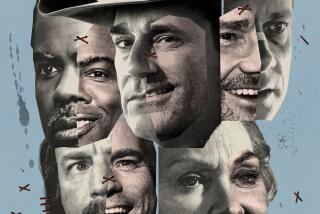Television review: Kelsey Grammer in ‘Boss’
- Share via
There is something essentially likable about Kelsey Grammer as a performer. That broad scholar-like forehead, the strong jaw and mild blue eyes all conspire to create the image of a sometimes bumbling but still powerful guy, best embodied by his most lasting character, Frasier Crane. This ability to project opposing forces is one reason Grammer has been so successful in comedy — he can play the fool and still remain an alpha male. It’s also why he is now able to breathe life into Frasier Crane’s hard-hearted doppelganger, Chicago Mayor Tom Kane, who is the centerpiece of Starz’s new political drama “Boss.”
It has become dramatic canon that all Chicago politicians are corrupt, and Kane is no different. He runs his town like a mobster, ordering deals, and flesh, to be cut with ruthless efficiency, wreaking havoc with the lives and careers of anyone who crosses him. In real life, such people are simply despicable; on television, where they congregate with alarming frequency, they are known as antiheroes. It helps that Grammer is able to give Kane the oratorical grace of a modern-day King Lear. (If he didn’t have such a checkered past, including an ex-wife parading their divorce on “The Real Housewives of Beverly Hills,” one could imagine Grammer running for public office, something in which he has, despite these obvious obstacles, expressed an interest.) It also helps that we meet Kane as he learns he has a degenerative neurological disease, an Alzheimer’s-like condition that will deprive him of brain and muscle control before it kills him. But not, perhaps, before he is forced to reconsider some of the choices he has made in his life, including his emotional estrangement from his wife, Meredith (Connie Nielsen), and their abandonment of troubled daughter Emma (Hannah Ware).
Much has been made of Grammer’s decision to follow the path trampled smooth by fellow sitcom darlings Bryan Cranston and Ray Romano (and before them, British comedian Hugh Laurie), who traded in the laugh tracks for a chance to explore darker themes. But it is a very natural transition — most good comedy is a language of rage and despair, ruthless too, in its own way. So it’s not surprising that Grammer shines just as steady and bright playing a corrupt city official as he did an arrogant radio therapist.
Good thing too, since “Boss” relies so heavily on his performance. Unlike “Breaking Bad,” “Men of a Certain Age,” and even “House,” “Boss” is not trying to be edgy or particularly brave in its storytelling. Where “Breaking Bad” took an old trope — knowledge of imminent death begets positive transformation — and turned it inside out, creator Farhad Safinia and writers Richard Levine and Lyn Greene seem to be following the traditional version. They fully embrace formula — the corrupt development deals, the chilly wife, the troubled daughter, the suave but dastardly up-and-comer, the dogged reporter, all seem, in early episodes anyway, to be working together to force Kane to accept his personal truth in a very old-fashioned way.
It’s a solid enough formula, and if the writers have overly epic ambitions, they also have a collective eye for detail. The pilot, directed by Gus Van Sant, is visually rich and textured, opening as it does in an abandoned slaughterhouse. (Hog butcher for the world, people, in case you’ve forgotten.) The characters may be stock — reporter Sam Miller (Troy Garity) is determined to bring Kane down; daughter Emma is fighting her addictions, Kane’s one female staffer, Kitty (Kathleen Robertson), is a vision of spectacled hotness — but it’s reliable stock and given, in the first few episodes, a promising amount of depth. Not in every case — Kitty predictably, has an up-against-the-stairwell-wall affair with rising star and family man Ben Zajac (Jeff Hephner), and the wonderful Martin Donovan does not have nearly enough to do as Kane’s right-hand man, Ezra — but the characters seem capable of lifting some of the narrative burden from Kane’s shoulders.
Which is what will determine if “Boss” becomes Starz’s first genuine hit. One performance, even a great one, is not enough — even the most accomplished Lear needs to trust the stage to the other players, if only so he can have a moment to draw breath.
More to Read
The complete guide to home viewing
Get Screen Gab for everything about the TV shows and streaming movies everyone’s talking about.
You may occasionally receive promotional content from the Los Angeles Times.







